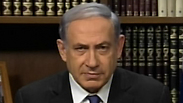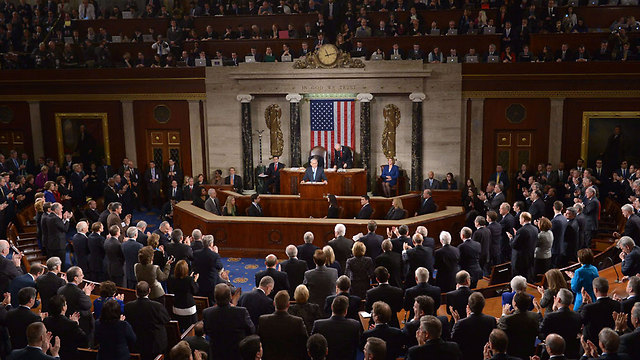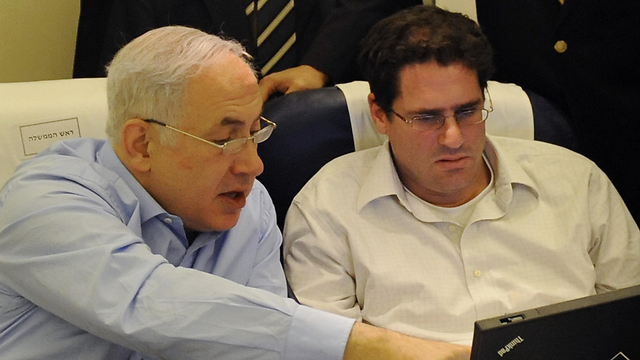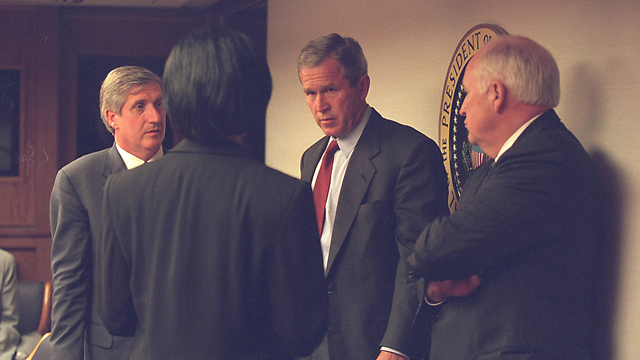
On the edge of the abyss
Analysis: Israel is willing to do anything to thwart the nuclear deal, including publicly threatening Iranian scientists, interfering with the internal affairs of the US, and dividing US Jews; meanwhile, Netanyahu's mistaken 2002 assessment of Iraq is coming back to haunt him in his battle against Tehran.
The past summer has been one of the strangest we've known, a crazy summer. A great diplomatic drama is unfolding, one that could have a considerable effect on our lives, but it only occupies those dealing with the issue. A handful of bureaucrats, military men, politicians, journalists. Diplomats are dispatching coded telegrams to their capitals, in which they admit they do not have any explanation of what is going on.
"Every day I wake up feeling it cannot possibly be worse," says one of those closely monitoring the crisis. "And every day I'm surprised anew."
The nuclear agreement with Iran causes great concern in Israel. The entire world understands that. The question is how Israel's leadership is dealing with these concerns. What is it that Israel hopes to achieve in the war it is waging against the Obama administration? What is its plan in case Congress comes to terms with the presidential veto, which would lead to the approval of the agreement? What is its plan in case the majority in Congress defeats the president, and the US has to reject the agreement? Is anyone in Jerusalem or Tel Aviv doing this cost-benefit analysis? Is anyone thinking about the day after?
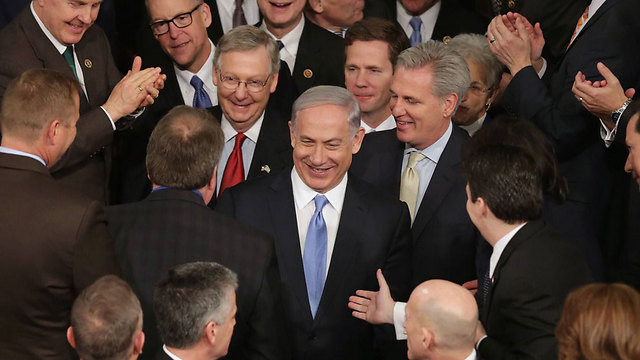
The American administration in Washington is following what is happening in Israel, and notices the following things:
![]() At this point in the crisis, Israel has no cabinet, no government, no defense establishment, no Knesset, no free media. Everything is determined and run based on the desires of one person - Benjamin Netanyahu. The IDF prepared, as is expected of it, official opinions about the agreement and its consequences. These opinions are balanced - they analyze the downsides of the agreement, along with its advantages. No one delayed the arrival of these opinions to the top. The cabinet ministers are aware of them. They also know what the head of Army Intelligence thinks and what the Chief of Staff thinks, and whether there is a gap between their conclusions and those of the prime minister. But there was no serious discussion in the cabinet about the day after the US Congress vote.
At this point in the crisis, Israel has no cabinet, no government, no defense establishment, no Knesset, no free media. Everything is determined and run based on the desires of one person - Benjamin Netanyahu. The IDF prepared, as is expected of it, official opinions about the agreement and its consequences. These opinions are balanced - they analyze the downsides of the agreement, along with its advantages. No one delayed the arrival of these opinions to the top. The cabinet ministers are aware of them. They also know what the head of Army Intelligence thinks and what the Chief of Staff thinks, and whether there is a gap between their conclusions and those of the prime minister. But there was no serious discussion in the cabinet about the day after the US Congress vote.
![]() Unlike the Gulf States, which are fighting against the agreement while at the same time negotiating with the American administration about their security on the day after, Israel, under Netanyahu's orders, has stopped cooperating with Washington. Talks over a memo of understandings between the two states were due to start in April. These understandings were to make up a framework for the next ten years, determining, among other things, guidelines for security aid. It's important to the Israeli defense establishment to know what to expect. Nevertheless, there are no talks. There are also no negotiations over the compensation Israel is supposed to get over the deal with Iran and the new security benefits given to the Gulf States.
Unlike the Gulf States, which are fighting against the agreement while at the same time negotiating with the American administration about their security on the day after, Israel, under Netanyahu's orders, has stopped cooperating with Washington. Talks over a memo of understandings between the two states were due to start in April. These understandings were to make up a framework for the next ten years, determining, among other things, guidelines for security aid. It's important to the Israeli defense establishment to know what to expect. Nevertheless, there are no talks. There are also no negotiations over the compensation Israel is supposed to get over the deal with Iran and the new security benefits given to the Gulf States.
![]() The fight in Congress is so important to Netanyahu that he is willing to divide the Jewish community and turn AIPAC into a single-party organization. Democratic Congressmen are torn between their loyalty to their president and their party, and their fear of losing Jewish voters and donors. All of the Democrats who announced they would oppose the agreement so far are Jewish: Chuck Schumer, Eliot Engel, Nita Lowey - all from New York. Jews from other districts are conflicted between the concern they could be accused of having a double loyalty - primarily to Israel and only then to the United States - and the claim made by Jewish voters that they were sacrificing Israel for their career.
The fight in Congress is so important to Netanyahu that he is willing to divide the Jewish community and turn AIPAC into a single-party organization. Democratic Congressmen are torn between their loyalty to their president and their party, and their fear of losing Jewish voters and donors. All of the Democrats who announced they would oppose the agreement so far are Jewish: Chuck Schumer, Eliot Engel, Nita Lowey - all from New York. Jews from other districts are conflicted between the concern they could be accused of having a double loyalty - primarily to Israel and only then to the United States - and the claim made by Jewish voters that they were sacrificing Israel for their career.
![]() Netanyahu managed to convince many Jews that the threat is that of another Holocaust. The residue of guilt left from the world war - how could we be silent? Why did we allow the American administration to look away from the extermination camps? - all came back to the surface. Khamenei's comments and the calls from the crowds in Tehran only serve to bolster that feeling. Obama and Kerry's half-hearted acceptance of these comments only adds to the feeling of betrayal.
Netanyahu managed to convince many Jews that the threat is that of another Holocaust. The residue of guilt left from the world war - how could we be silent? Why did we allow the American administration to look away from the extermination camps? - all came back to the surface. Khamenei's comments and the calls from the crowds in Tehran only serve to bolster that feeling. Obama and Kerry's half-hearted acceptance of these comments only adds to the feeling of betrayal.
![]() Israel's Ambassador to Washington Ron Dermer is, according to American accounts, making the rounds from one room to the next in Congress, from one office to another, trying to convince the members of Congress to vote against the deal. From their perspective, this is an intolerable interference in the internal affairs of another nation. You could only imagine what Israel would think if the American ambassador was working to lobby members of the Likud party to vote against Netanyahu. The American administration will have a hard time letting this go after the crisis passes; Obama, despite his aversion to mixing personal feelings with politics, will not forgive this.
Israel's Ambassador to Washington Ron Dermer is, according to American accounts, making the rounds from one room to the next in Congress, from one office to another, trying to convince the members of Congress to vote against the deal. From their perspective, this is an intolerable interference in the internal affairs of another nation. You could only imagine what Israel would think if the American ambassador was working to lobby members of the Likud party to vote against Netanyahu. The American administration will have a hard time letting this go after the crisis passes; Obama, despite his aversion to mixing personal feelings with politics, will not forgive this.
A concerned citizen
In September of 2002, former prime minister, the concerned citizen Benjamin Netanyahu, decided to save the world from an enemy like no other. He chose an appropriate stage: The US Congress. His testimony, made to a House of Representatives sub-committee, was filmed and is available online in its full version (43 minutes), an abridged version (five minutes), and an even more abridged version (four minutes). If you're really interested, I recommend finding the video on Google under "Netanyahu expert testimony on Iraq in 2002 - C-SPAN." It is worth the effort.
The members of Congress were debating at the time whether to support an American invasion of Saddam Hussein's Iraq, or oppose it. At the heart of the debate was the question of whether Saddam Hussein's Iraq was developing weapons of mass destruction. Netanyahu sought to add his powerful influence, as well as that of his country, to the Republican campaign in favor of the invasion.
He spoke in the meeting while behind him, concerned citizen Ron Dermer - now Israel's ambassador to Washington - was whispering. The curious viewer could not help but wonder about Netanyahu's physical appearance - then and now. It turns out that in the years that have passed, his appearance has improved, his skin is thicker, his self-confidence is stronger. Returning to a leadership position has only done him good. The rest is not as positive.
Here is a selection of quotes.
"There is no question whatsoever that Saddam is seeking and is working and is advancing towards the development of nuclear weapons," Netanyahu determined. "A nuclear-armed Saddam will place the security of our entire world at risk. Make no mistake about it — if and once Saddam has nuclear weapons, the terror networks will have nuclear weapons."
The chairman, Congressman John Tierney, asked Netanyahu if Iraq played a part in the September 11 attacks. "It's not whether Iraq was connected to September 11, but how do you prevent the next September 11," Netanyahu responded.
An invasion of Iraq, Netanyahu explained, would save the world not just from Iraq, but from Iran as well. "The question now is a practical question," he said.
"What is the best place to proceed. It's not a question of whether Iraq's regime should be taken out, but when should it be taken out. It’s not a question of whether you’d like to see a regime change in Iran but how to achieve it," he continued. "Iran has something that Iraq doesn't have... (there are) internal forces of dissension that are available in Iran, which is paradoxically probably the most open society in that part of the world. It is a lot more open than Iraq which is probably the most closed society.
"If you take out Saddam, Saddam's regime, I guarantee you that it will have enormous positive reverberations on the region. And I think that people sitting right next door in Iran, young people, and many others, will say the time of such regimes, of such despots, is gone.
"In 1986 I wrote a book in which I had said that the way to deal with terror was to deal with the terrorist regimes. And the way to deal with the terrorist regimes among other things was to apply military force against them... as quickly as possible.
"People said that there would be tens of thousands of people streaming into Afghanistan, zealots outraged by America's invasion, and this would produce a counter-reaction in the Arab world... what we saw was everybody streaming out of Afghanistan.
"The application of power is the most important thing in winning the war on terrorism. If I had to say what are the three principles of winning the war on terror: winning, winning, and winning... The first victory in Afghanistan makes a second victory in Iraq that much easier. The second victory in Iraq will make the third victory that much easier, too."
And now for the facts, as they are known today: Saddam didn't have nuclear weapons, nor was he working on obtaining such weapons; he didn't play a part in the September 11 attack - his terrorism was mostly aimed at the Iraqi people; the invasion, that started in March 2003, lasted nine years and left behind 100,000 Iraqi deaths and 4,800 deaths among the coalition forces, most of them American; it dissolved Iraq and left some of it open to Iran for the taking, strengthening the ayatollah regime instead of overthrowing it; it also made it easier for Iran to advance its nuclear program; and brought hundreds of thousands of terrorists into the area to fight in the ranks of crazy organizations like the Islamic State and al-Qaeda. America didn't go from victory to victory, it went from one failure to the next.
Very few are left in the US who are willing to defend that invasion. Even Jeb Bush, the brother of the president who decided to invade, admits it was an enormous mistake.
The belief that democracy can be forced on nations in the Middle East using military power, and that eliminating one tyrannical regime will necessarily lead to the downfall of another tyrannical regime, was a wish at best, and a bad marketing ploy at worst. Reality disproved it completely.
The IDF didn't push the Bush administration into Iraq. Moshe Ya'alon, who was the IDF chief of staff at the time, repeatedly told me in real time that the IDF wasn't pushing for the invasion, nor was it wishing for it. But performances like Netanyahu's, and a fiery campaign by neoconservatives - all enthusiastic Israel supporters, most of them Jewish - created the impression that it was Israeli lobbying that pushed to invade. Now, as Netanyahu tries to convince Congress to thwart the agreement with Iran, that speech is coming back to him like a boomerang.
Secretary of State Kerry mentioned Netanyahu's Iraq speech once, and won't do so again. But he will talk mockingly of Netanyahu while he, Kerry, and most of his colleagues on the left and right, all voted in favor of the invasion. The responsibility for this catastrophe is on their shoulders, not on the shoulders of the expert witness from Israel.
Diplomatic assessments are not an exact science. Neither are military assessments. Netanyahu's assessments about Iran cannot be rejected just because he was wrong about Iraq. But questions should be raised about his pretension, the complete lack of doubt. A little modesty wouldn't hurt him, neither then, nor now.
On the other hand, Netanyahu can be judged for the fact that as the prime minister of Israel, he did not implement a single piece of the advice he generously gave the Americans. He didn't initiate wars, wasn't quick to attack. He recommended to the Americans to conquer Iraq; in Israel, he was careful not to conquer Gaza. His goal was and still is to reach a state of calm with Hamas and Hezbollah, create deterrence, reach secret understandings; live with terrorism, not exterminate it. He only exterminates in other people's homes.













